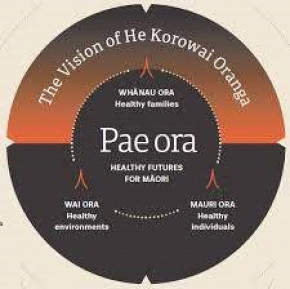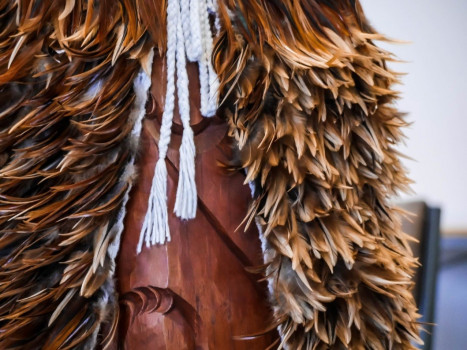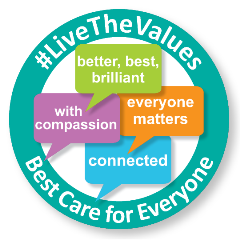Māori Workforce Recruitment
A toolkit for the integration of Taha Māori into the Waitematā DHB recruitment process
Kaupapa o Māori Workforce
Mission
To achieve better, best, brilliant health outcomes for Māori. Everybody matters and, with compassion and connectedness our mission is to nurture and grow our Māori workforce to provide best care for our community.
Purpose
To grow, retain and develop the capacity and capability of the Māori Health workforce across the Waitematā DHB. This commitment is based on the belief that building both the numbers (capacity of workforce) and the knowledge/skill base (capability of workforce) of our Māori health workforce across the Waitematā district supports and creates opportunity for “Pae ora” (Healthy futures for Māori) a Holistic concept that includes three interconnected elements; mauri ora (healthy individuals), whānau ora (healthy families), wai ora (healthy environments). Pae ora aim is to create the opportunity for Māori to live with good health and wellbeing in an environment that supports Māori to flourish and thrive as Māori.
Aim
- To achieve a minimum of 9.2% Māori workforce of overall workforce by 2025
- To also achieve 9.2% Māori in Priority workforce groups by 2025
- To grow the capabilities of our Workforce to engage more effectively with Māori by incorporating Tikanga and Kaupapa Māori
(We are presently at 7.18% overall and 6.39% priority as at End of FY20)

Pae ora Whakamaua – Māori Health Action Plan
Te Tiriti o Waitangi
Waitematā DHB respect and is committed to fulfilling Te Tiriti o Waitangi and the Memorandum of Understanding with Ngāti Whātua. Te Tiriti o Waitangi encapsulates the fundamental relationship between the Crown and Iwi. The four Articles of Te Tiriti o Waitangi provide a framework for Māori health and wellbeing and development by guaranteeing Māori a leading role in health sector decision making in a national, regional, and whānau/individual context. The New Zealand Public Health and Disability Act 2000 furthers this commitment to Māori health advancement by requiring DHBs to establish and maintain responsiveness to Māori while developing, planning, managing and investing in services that do and could have a beneficial impact on Māori communities. Te Tiriti o Waitangi provides four principals under which Māori health priorities can be established. The framework recognises an obligation to honour the beliefs, values and aspirations of Māori patients, staff and communities across all activities.
Te Tiriti o Waitangi – The Articles
Te Tiriti o Waitangi – The Articles
Waitematā DHB Commitments
Health partnership with mana Whenua
This principle is reflected in a Memorandum of Understanding between Te Rūnanga o Ngāti Whatua, Te Whānau o Waipareira and Waitematā DHB that outlines the partnership approach to working together at both governance and operational levels. This relationship will ensure the provision of effective health services for Māori resident within the rohe of Ngāti Whātua and the area where Te Whānau o Waipareira have strong connections with whānau.
Health equity
As a principle, health equity is concerned with eliminating avoidable, unfair and unjust systematic disparities in health between Māori and non-Māori. The concept of health equity acknowledges that different types and levels of resources may be required in order for equitable health outcomes to be achieved for different groups.
Ngā Kaupapa tuku iho
As a principle, ngā Kaupapa tuku iho requires acknowledgement and respect for distinctly Māori values, beliefs, responsibilities, protocols, and knowledge that are relevant to and may guide health service planning, quality and safety programming and service delivery for Māori.
Whole-of-DHB responsibility
Achieving best health outcomes for whānau and health equity for Māori is a whole-of-DHB responsibility. Therefore, contributing to Māori health gain and reducing ethnic inequities in health between Māori and non-Māori is an expectation of all health activities through Waitematā DHB.

Korowai, Tāne Whakapiripiri
Recruitment Process
Position Descriptions
The recruitment process begins with a vacancy. All vacancies require a Position Description (PD) that defines the core competencies required for appointment to the position. All PDs for staff employed within the Waitematā DHB have a generic Māori Health component that identifies Tikanga competencies that reflects key accountabilities. It is important you are using the most recent PD template click here for this template
Generic Tikanga competencies for all staff
- Ensures the professional and political integrity of WDHB by carrying out all functions in compliance of the Treaty of Waitangi and by demonstrating a serious commitment to keeping the Treaty alive.
- Shows sensitivity to Tikanga complexity in the workforce and patient population
The above is under review
Tikanga competencies for clinical facing roles
- When making appointments for those meeting the Tikanga competencies requiring extra skill please contact He Kāmaka Waiora (Māori Health Team) click here for their contact details.
- For additional Tikanga competencies Appendix 1: Māori Workforce Recruitment Tikanga Competencies
Any roles that are specific to Māori Health, Kaupapa Māori or Māori Health Gains must have the Position Description reviewed and confirmed by He Kāmaka Waiora (Māori Health).
The Recruitment Consultant for the ATR should be the Māori Workforce Recruitment Consultant.
Advertising
Please contact your Recruitment Consultant for queries and support on advertising or Māori Workforce Recruitment Consultant if your role is a Māori specialist role or team.
Shortlisting
Recruiters are responsible for shortlisting applicants for your review; this is against a set of criteria that measures competency and job requirements as set by the Job Description and Hiring Manager.
- All Māori candidates who are eligible and meet job requirements will be automatically shortlisted for interview. You will be notified by your Recruitment Consultant of any candidates that require interview. These candidates must be interviewed alongside other candidates you wish to interview.
Interview
Interview Panel
Interviews should be conducted by no less than 2 people experienced in both interviewing and in the position requirements, including Tikanga competency. This should be a structured format, and for consistency sake, all candidates being asked the same Tikanga, cultural and behaviourally based questions and being evaluated by the same people. Questions should include those that evaluate applicant’s knowledge of Te Tiriti o Waitangi and how it relates to Health and Māori Health Gain. It is expected that New Zealand based practitioners have knowledge of Māori health status, The Treaty of Waitangi, can apply it to practice and have a basic understanding of Tikanga Māori and Te Ao Māori principals. Where positions will be responsible for working within high statistics of Māori in their communities it is encouraged to have a representative from either the Māori Health Team or Māori Health Led experiences to support the Panel.
- For a list of available Interview questions regarding; Te Tiriti o Waitangi, Māori Health gain, and engagement with Māori see Appendix 2: Māori Workforce Recruitment Interview Questions
- Appointment of ELT and ELT direct reports – Hiring managers are to contact the Chief Advisor Tikanga or the General Manager Māori Health to participate on interview panels
- Where Māori candidates are being interviewed, it is important that the panel also has, where possible, senior Māori representation.
- If you do not wish to interview a candidate, you must discus this with your GM before you make a decision and written approval from the GM is required and provided to recruitment.
- In our commitment and deliverance of Tino Rangatiratanga (self-determination) and Kawanatanga (governance) every effort should be made to ensure effective Māori participation in the interview process. It is a requirement to inform Māori Health well in advance of your need for Māori representation on the interview panel. At least 3 weeks in advance.
Interview and whānau tautoko/family support
Māori are encouraged to bring Whānau support with them. Whānau are provided the opportunity to speak to the strengths, experiences and attributes of their whānau member being interviewed. Please see Whānau / Family support interview guidelines for more information. All Māori applicants should be given a letter that covers the following guidelines on whānau tautoko. See Appendix 3: Interview Invitation

Northcross Intermediate kapa haka ropū o 2019
Incorporating Kaupapa Māori in your interview practice
Aim three of developing our capabilities of the workforce to engage more effectively with Māori by incorporating Tikanga and Kaupapa Māori will allow the opportunity for Tikanga and Kaupapa to be present in your interviews.
The Māori Workforce Recruitment Training for Hiring Managers will be available and aiming to be released in June 2021. In the interim please download and utilize the *Āke Āke app to learn more about Kaupapa Māori and how you can utilize aspects such as Karakia, pronunciation of the reo and manākitanga to be fundamentals of your interview practice.
*Ake ake app
- Ake ake is an educational resource for Waitematā DHB staff to learn about basic Tikanga, Te Reo Māori pronunciation and waiata
Offer of employment
When extending the offer / contract to a successful candidate this should be informed in writing included within the template should be the following note:
“We understand you may wish to discuss this offer of employment with whānau and hence request your decision within 7 working days. Should you have any queries or clarifications please contact your Recruitment Consultant at the very first instance.”
Please see Appendix 4: Offer of employment for a copy of this communication.
Pōwhiri / Mihi Whakatau Process
The purpose of a pōwhiri or mihi whakatau in the Waitematā DHB is twofold:
- To welcome a person or people into the Waitematā and enfold them in the mana (protection) of Ngāti Whatua
- Provide mana (protection) of Ngāti Whātua over a building or situation
The policy statement for our Pōwhiri or mihi whakatau is the Waitematā DHB is committed to meeting their Treaty obligations. In line with this the District Health Board recognize the relationship between themselves and mana whenua through a Memorandum of Understanding with Ngāti Whātua. A pōwhiri or mihi whakatau is part of this.
Please see Page “Legislations, Policies and Documents” for the link to the Pōwhiri/Mihi Whakatau Policy. It also includes Appendix 1: Registration form and Appendix 2: Tikanga o Ngāti Whātua for your reference.
Training / Education Opportunities
Our Whole-of-DHB-Responsibility and Best Practice Tikanga Policy will be the baseline of your Tikanga competency that will deliver the success of our achievements in both increasing our Māori workforce but towards better health outcomes for Māori. In addition to these we have available additional training and education opportunities to engage better, for best practice and brilliant results. See Ko Awatea LEARN to schedule your training.
- Login
- From home page
- Select Waitematā DHB Course Category
- Select Cultural Competency and Diversity
- Select your course
Engaging effectively with Māori Level 1
- This specialist development programme is designed to provide the knowledge and skill to engage effectively with Māori in culturally competent, culturally safe and culturally intelligent ways. This is a transformational programme, open to all staff members. The sessions are led by Hone Hurihanganui.
Māori Cultural Perspectives – Te Pumaomao
- This course is for Waitematā DHB staff only who are wanting to learn more about Māori cultural perspectives. We encourage staff who have regular interactions with Māori patients and whānau to sign up to this course. You will benefit from a Marae-based event governed by Māori protocol.
Hauora Māori with Dame Rangimarie Naida Glavish, Chief Advisor Tikanga
- This 1.5 hour presentation is for Waitematā DHB staff seeking a better understanding and communicate more effectively with Māori patients and their whānau. Dame Naida provides an overview of health and well-being within a Māori individual through the representation of “Haki Nohi”, also noting that this representation of well-being is not exclusive to Māori.
Te Reo Māori classes
- Te Pōkaitahi Reo – Certificate in Māori Language (Level 3)
Legislations, Policies and documents
Recruitment Policy for Interviewing Māori
Māori Values and Concepts (Tikanga) Policy
The Pōwhiri and Mihi whakatau Policy
Whānau/Family Interview Guidelines
He Korowai Oranga Māori health Strategy
Whakamaua – Māori Health Action Plan 2020-2025
New Zealand Health and Disability Act 2000
Māori Health Plan Auckland and Waitematā District Health Board
Waitematā DHB Statement of Intent
Contacts
Charlene Macrae
Māori Workforce Recruitment Consultant
charlene.macrae@waitematadhb.govt.nz
09 443 9030 extn 47030
He Kāmaka Waiora Services
North Shore and Waitakere Hospitals 09 486 8324 extn 42324
Dame Rangimarie Naida Glavish DNZM. JP
Chief Advisor Tikanga
Naida.glavish@waitematadhb.govt.nz
Vanessa Watene
EA to Chief Advisor Tikanga
Vanessa.watene@waitematadhb.govt.nz
Nigel Chee
General Manager Māori Health
Nigel.chee@waitematadhb.govt.nz
Sheree Taylor
EA to General Manager Māori Health
Sheere.taylor@waitematadhb.govt.nz
To download a copy of the toolkit to print out click here.
Click here to get your Maori Workforce Recruitment checklist

